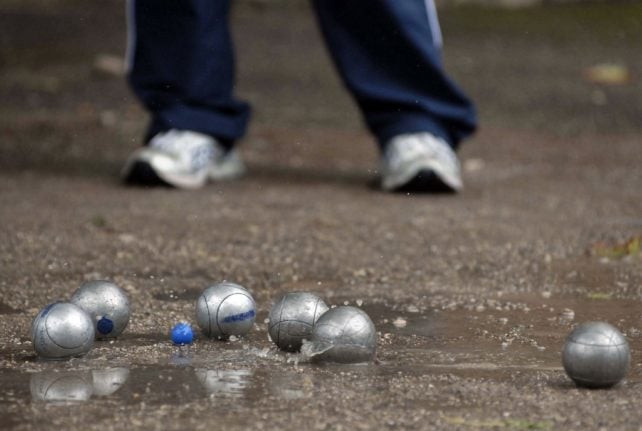That means sandals and booze are definitely out and I wont even go into smoking and the new dress code. Let me explain.
The people who run the game have been trying to change its image in recent years to well – look and feel more like a professional sport and there is a reason behind this.
With the 2024 Olympics being held in Paris, they started lobbying to turn Pétanque into an Olympic sport – what greater publicity than the world’s TV cameras focused on rows and rows of competitions say on the Champs Elysee with a backdrop of the Arc du Triomphe?
But it didn’t work out, at least not this time. The French hosts of the 2024 Olympic Games thought about it and picked breakdancing instead.
Michel le Bot is the powerful regional president of the Occitanie Pétanque league – which with 62,000 paid-up members is the biggest in the country. With ill-disguised disgust he said that it was all about chasing the youth audience when Paris should have been promoting its own cultural symbols.

A judge measures the distance between the balls and the target. Photo: Chris Bockman
But pétanque’s drive to become more respectable is here to stay. There are new rules about what you can wear and behaviour – partly in an attempt to look better on TV with dramatic close-up shots and instant slow motion replays.
So here is a guide to what you can and can’t do.
- In all competitions drinking alcohol is out – and don't even think about smoking.
- Jeans are tolerated in some less important events, but no jeans or trousers with holes even if they are designer tailored ripped jeans.
- Certain types of sport shorts are okay but for women its complicated – no skirts or dresses.
- Mini shorts are out too and don't even think about bathing shorts.
- For both sexes no bare arms and shoes with laces only are allowed.
Basically the more important the competition the more stringent the uniform rules. The umpires have been told to turn away players who aren’t dressed properly and some have told me they keep spare shoes and shirts in their cars for recalcitrant players who turn up with a Gallic shrug saying they have nothing else to wear.
When I said to Michel le Bot it was a bit harsh not allowing players to drink pastis on a warm day he snapped back: “Are English professional rugby players allowed to drink beer during the game? Of course not so why should ours?”
He added the boulodrome – the name of the pitch where the game is played – is their equivalent to a stadium so rules should be enforced just as stringently.
Last year in the Toulouse area more than 100 surprise breathalyzer tests were carried out on players and a few were excluded – there are even random drug tests – which gives you an idea of how serious the officials are these days.
The no-drinking rule is entirely understandable. I went to a big regional competition in Melville a small commuter village north of Toulouse with about 200 competitors.

Competitors at a regional tournament in Melville, south west France. Photo: Chris Bockman
One of the umpires, Joel Lanotte who’s real job is bolting parts together on the Airbus assembly lines, told me people who drink and play under the scorching sun are more likely to cheat.
The kind of underhand tricks they get up to include sneezing just when their opponents are about to throw their boule, or suddenly talk very loudly or dropping the cloth they use to wipe the dirt off the boules with.
Other surly drunk players may slyly push a small stone under one of the boules or the wooden small ball or target known as a cochonnet which is of course key to the whole game.
And to add to all the made for TV drama – the umpire has three cards to sanction players – one is a yellow for a warning, an orange one means a player forfeits a throw and a red card is instant expulsion.
The players I talked to grumbled about the sport losing its soul with too many new rules and restrictions – but with the pandemic they are now distraught.
The sport has been suspended since late March – in an activity where social distancing is nearly impossible and everyone touches the wooden ball all official competitions are off until late January at the earliest.
And village mayors have also been told to stop locals playing too which is a difficult decision to make with the lockdown and so much spare time on people’s hand these days.
I was told in one small beautiful village of Penne in the Tarn that the Gendarmerie were tipped off about an illicit boules game taking place (prohibition French style). By the time they arrived there were just two players left – the others had left for take-away pastis at the nearest cafe.
And rest assured – old habits die hard – when I attended that competition in Melville – there was a makeshift bar next to the boulodrome and it was heaving.
Chris Bockman is based in Toulouse and is the author of “Are you the foie gras correspondent? Another slow news day in south west France.”



 Please whitelist us to continue reading.
Please whitelist us to continue reading.
Breakdancing a sport? Gordon Bennet they’ll be having pushing shopping trollies next.